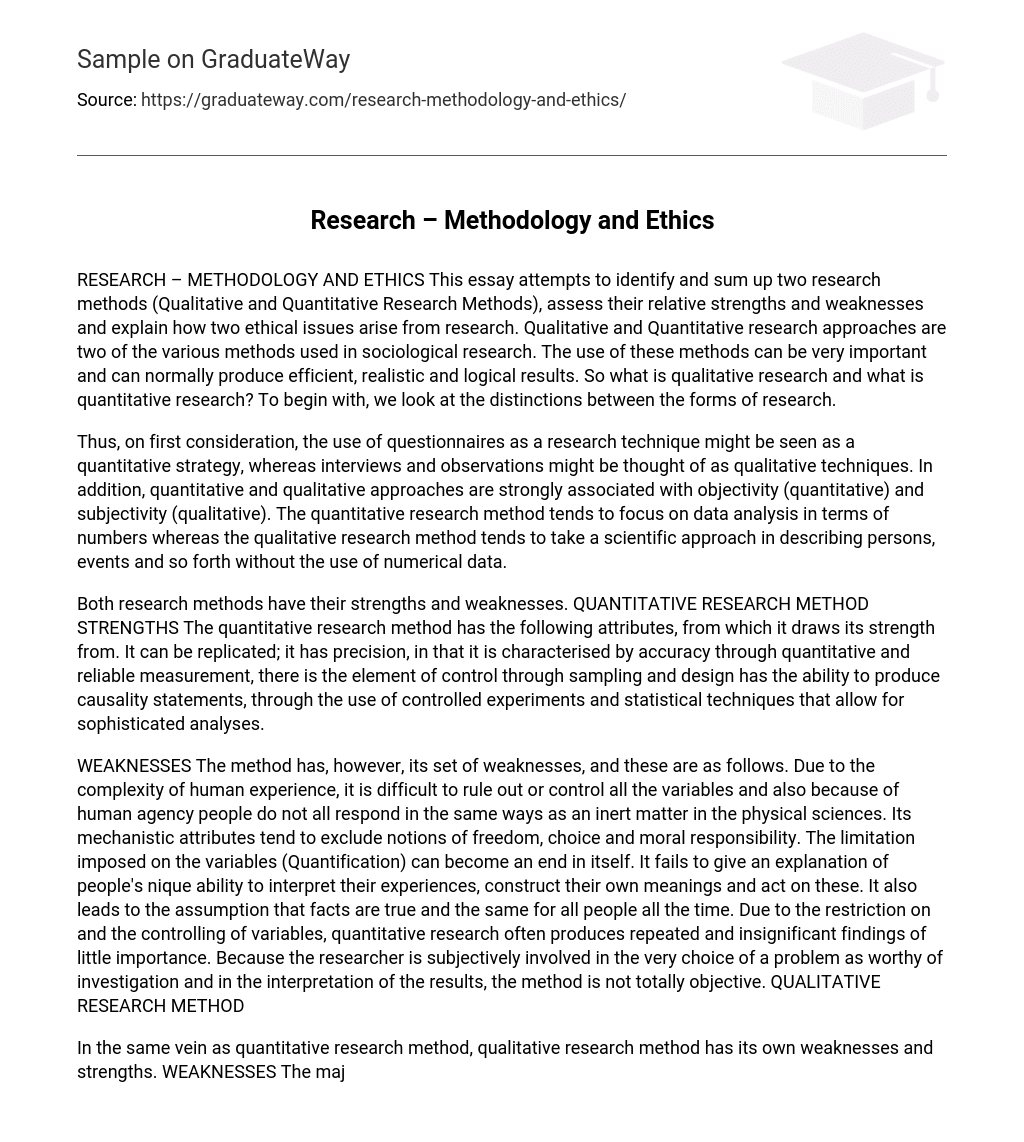This essay attempts to identify and sum up two research methods, assess their relative strengths and weaknesses and explain how two ethical issues arise from research. Qualitative and Quantitative research approaches are two of the various methods used in sociological research. The use of these methods can be very important and can normally produce efficient, realistic and logical results. So what is qualitative research and what is quantitative research? To begin with, we look at the distinctions between the forms of research.
Thus, on first consideration, the use of questionnaires as a research technique might be seen as a quantitative strategy, whereas interviews and observations might be thought of as qualitative techniques. In addition, quantitative and qualitative approaches are strongly associated with objectivity and subjectivity. The quantitative research method tends to focus on data analysis in terms of numbers whereas the qualitative research method tends to take a scientific approach in describing persons, events and so forth without the use of numerical data.
Both research methods have their strengths and weaknesses. The quantitative research method has the following attributes, from which it draws its strength from. It can be replicated; it has precision, in that it is characterised by accuracy through quantitative and reliable measurement, there is the element of control through sampling and design has the ability to produce causality statements, through the use of controlled experiments and statistical techniques that allow for sophisticated analyses.
The method has, however, its set of weaknesses, and these are as follows. Due to the complexity of human experience, it is difficult to rule out or control all the variables and also because of human agency people do not all respond in the same ways as an inert matter in the physical sciences. Its mechanistic attributes tend to exclude notions of freedom, choice and moral responsibility. The limitation imposed on the variables (Quantification) can become an end in itself. It fails to give an explanation of people’s nique ability to interpret their experiences, construct their own meanings and act on these. It also leads to the assumption that facts are true and the same for all people all the time. Due to the restriction on and the controlling of variables, quantitative research often produces repeated and insignificant findings of little importance. Because the researcher is subjectively involved in the very choice of a problem as worthy of investigation and in the interpretation of the results, the method is not totally objective.
In the same vein as quantitative research method, qualitative research method has its own weaknesses and strengths. The major criticism lies on the problem of adequate validity or reliability. Mainly, because of the subjective nature of qualitative data and its origin in single contexts, it is difficult to apply conventional standards of reliability and validity. Replication is also a major issue here. Contexts, situations, events, conditions and interactions cannot be replicated to any extent, nor can generalisations be made to a wider context than the one studied with any confidence.
The time required for data collection, analysis and interpretation are lengthy and tedious. Researcher’s presence has a far-reaching effect on the subjects (individuals) of study. Issues of anonymity and confidentiality present problems when selecting findings. The viewpoints of both researcher and participants have to be identified and made clear because of issues arising from partiality that prevents objective consideration.Because of close researcher involvement, the researcher gains an insider’s view of the field.
This allows the researcher to find issues that are often missed by the scientific, more positivistic enquiries. Qualitative descriptions can play the important role of suggesting possible relationships, causes, effects and dynamic processes. Because statistics are not used, but rather qualitative research uses a more descriptive, narrative style, this research might be of particular benefit to the practitioner as she, or he could turn to qualitative reports in order to examine forms of knowledge that might otherwise be unavailable, thereby gaining new insight.
Qualitative research adds flesh and blood to social analysis. Both qualitative and quantitative research methods have some similarities, for instance, whilst quantitative research may be mostly used for testing theory, it can also be used for exploring area and generating hypotheses and theory. Similarly qualitative research can be used for testing hypotheses and theories even though it is mostly used for theory generation. Qualitative data often includes quantification, e. g. statements such as more than, less than, most as well as specific numbers, quantitative, i. . questionnaire approaches can collect qualitative data through open-ended questions.During the designing of questionnaires and the training of interviewers a number of ethical issues need to be taken into consideration. Respondents have a right to be informed about the nature and purposes of the study and how the information will be used prior to data collection. The issue of anonymity, confidentiality and safeguarding the respondents, especially on sensitive questions must be strongly emphasised.
By creating a friendly relationship and rapport between the interviewer and the respondent will make the respondent confident therefor minimising chances of a possible harm or upset during the interview. Data must be stored safely and securely to ensure compliance with the data protection act. It will be very ideal to leave out names and addresses.Unstructured interviews and participant observation are more open and unpredictable.
Because of their nature, the weight lies heavily on the judgements and skills of the researcher. Some ethical issues with regards to obtaining informed consent arise, especially were the participant observer is concerned. Another area where qualitative research raises a questionable approach is when one is conducting a covert research. Failing to reveal the true purpose of your presence contradicts three standard ethical guidelines. There is no attempt to gain informed consent, the participants are deceived and their privacy is invaded.





